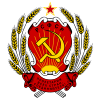- Vyacheslav Menzhinsky
-
Vyacheslav Menzhinsky
Вячесла́в Менжи́нский
Chairman of the OGPU In office
30 July 1926 – 10 May 1934Premier Vladimir Lenin Preceded by Felix Dzerzhinsky Succeeded by Genrikh Yagoda People's Commissar for Finance of the RSFSR In office
30 October 1917 – 21 March 1918Premier Vladimir Lenin Preceded by Ivan Skvortsov-Stepanov Succeeded by Isidore Gukovsky Personal details Born August 19, 1874
Saint Petersburg, Russian EmpireDied 10 May 1934 (aged 59)
Moscow, Union of Soviet Socialist RepublicsPolitical party All-Union Communist Party (bolsheviks) Vyacheslav Rudolfovich Menzhinsky (Russian: Вячесла́в Рудо́льфович Менжи́нский, Polish: Wiaczesław Mężyński; 19 August 1874 - May 10, 1934) was a Polish-Russian revolutionary, a Soviet statesman and Party official who served as chairman of the OGPU from 1926 to 1934. Fluent in over ten languages (including Korean, Chinese, Turkish, and Persian, the last one learned especially in order to read works by Omar Khayyám), Menzhinsky was the second and last member of the Polish nobility among the Lubyanka's leaders.
Contents
Early life
Wiaczesław Mężyński, a hereditary dvoryanin, was born into a Polish family of teachers. He graduated from the Faculty of Law at Saint Petersburg University in 1898 and joined the Russian Social Democratic Labour Party (RSDLP) in 1902. In 1905 he became a member of the military organization of the Petersburg Committee of the RSDLP. In 1906 Mężyński was arrested, but was able to escape from Russia. He lived in Belgium, Switzerland, France, USA, working in foreign branches of the RSDLP. After the February Revolution of 1917, Mężyński returned to Russia in the summer of that year.
Later life and death
According to G. von Schantz, "Menshinski personally conducted the wrecking of the Russian banks, a maneuver that deprived all opponents of Bolshevikism of their financial means of warfare."
"From 1919 he was a member of the Presidium of Cheka, and five years later became a deputy chairman of its successor, the OGPU. After Felix Dzerzhinsky's death in July 1926 Menzhinsky became the chairman of the OGPU. Menzhinsky played a great role in conducting the secret Trust and Sindikat-2 counterintelligence operations, in the course of which leaders of large anti-Soviet centers abroad, Boris Savinkov and Sidney Reilly, were lured to the USSR and arrested.
At the same time, as a senior Chekist, Menzhinsky was loyal to Joseph Stalin, whose personality cult had already begun to form, coinciding with several important purges in 1930-1931.[citation needed] Trotsky, who had met him before the revolution, thought him unremarkable: "He seemed more like the shadow of some other unrealized man, or rather like a poor sketch for an unfinished portrait."
Menzhinsky spent his last years as an invalid, suffering from acute angina which rendered him incapable of physical exertion. He conducted the affairs of the OGPU while lying upon a couch in his office at the Lubyanka.
Menzhinsky died of natural causes in 1934. When his successor, Genrikh Yagoda, made his public confession under duress at the Moscow Trial of the Twenty One in 1938, Yagoda stated that he had poisoned Menzhinsky.
References
- Great Soviet Encyclopedia
- (Russian) A Pince-nez Among Leather Jackets, a biography article at the FSB website
- The German-Bolshevik Conspiracy, War Information Series No. 20, October 18, p. 9.
External links
Political offices Preceded by
Ivan Skvortsov-StepanovPeople's Commissar for Finance of the RSFSR
30 October 1917 – 21 March 1918)Succeeded by
Isidore Gukovsky Ministers of Finance of the Russian Soviet Federative Socialist Republic
Ministers of Finance of the Russian Soviet Federative Socialist RepublicPeople's Commissars for Finance (1917-1946) Ivan Skvortsov-Stepanov • Vyacheslav Menzhinsky • Isidore Gukovsky • Nikolay Krestinsky • Grigori Sokolnikov • Myrov Vladimirov • Nikolai Milutin • Varvara Yakovleva • Vasili Popov • M.N. Umonov • Arseny Sofronov • Alexei Homespun • Arseny Sofronov
Ministers of Finance (1946-1991) Categories:- 1874 births
- 1934 deaths
- Russian people of Polish descent
- Bolsheviks
- Bolshevik finance
- Cheka
- Old Bolsheviks
- People buried in the Kremlin Wall Necropolis
- Polish communists
- Russian Social Democratic Labour Party members
- Russian nobility
- Russian revolutionaries
- Saint Petersburg State University alumni
- Soviet politicians
- Human experimentation in Russia
Wikimedia Foundation. 2010.
